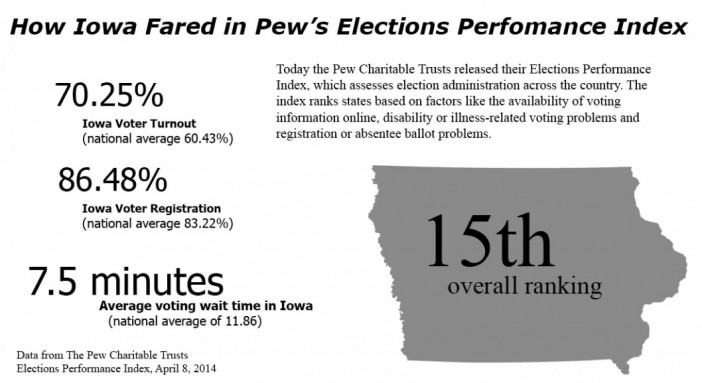WASHINGTON — Iowa had among the highest rates of rejected mail, military and overseas ballots in the nation during the last three election cycles, according to data released today by the Pew Charitable Trusts.
Nearly six percent of Iowa’s military and overseas ballots were rejected for some reason. The national average, according to the report, is five percent.
Pew, a nonprofit research organization, collected military and overseas ballot data from the U.S. Election Assistance Commission’s election administration and voting survey, which didn’t include information about why ballots were rejected.
Military and overseas ballots may be turned away for a variety of reasons, including obvious mistakes such as missing signatures or the mailing of empty ballot envelopes, says Doug Jones, associate professor of computer science at the University of Iowa.
“Military ballots are likely to be more irregular because people might not be in the best of circumstances when they’re sending them in,” said Jones, the author of “Broken Ballots,” a book on flaws in voting systems that surfaced after the 2000 presidential election.
Jones, who has also consulted with the Overseas Vote Foundation, pointed out that overseas and military ballots may also be rejected because some voters send them in as back-ups for absentee ballots – causing duplication.
The Pew data also disclosed that 21 percent of military and overseas ballots originating in Iowa were simply unreturned.
“Military members serving overseas often have a very difficult time trying to cast a ballot,” said Chance McElhaney, spokesperson for Secretary of State Matt Schultz. “Undoubtedly, we urge any military member that is having issues to contact our office or their county auditor to get any assistance they need.”
McElhaney pointed out that Schultz has made various efforts to ease the difficulty of overseas voting for service members.
Unrelated to overseas ballots, about half of one percent of in-state Iowan’s mail ballots were rejected during the 2008, 2010 and 2012 elections – a relatively small number but about double the national average, the study said.
Iowans may submit mail ballots for any reason – they don’t need to justify their request for a mail ballot, unlike in some states.
The report did include good news for Iowans. The state was one of only three in the country to see an increase in voter turnout between 2008 and 2012. It ranked fifth in the country, with the turnout rate averaged from the last three major election cycles at slightly more than 70 percent.
Jones thinks that voter turnout reflects parties doing a better job of putting interesting and compelling candidates on the ballot.
Iowa now ranks 15th out of all fifty states on Pew’s Elections Performance Index, down from 13th last year. It was one of only 10 states to drop in the updated rankings.
In general, the study found that election performance by all states improved. The study assessed 17 indicators of performance by voting administrators, including wait times at polling places, availability of voter information online and accuracy of voting technology.
“States are pioneering innovations that make a real difference in the efficiency and accuracy of their elections operations while also saving money,” said David Becker, director of Pew’s election initiatives project.
Forty states improved their rankings, with North Dakota coming out on top. Mississippi, which provided incomplete data for many of the indicators, according the Pew, received the lowest ranking.

